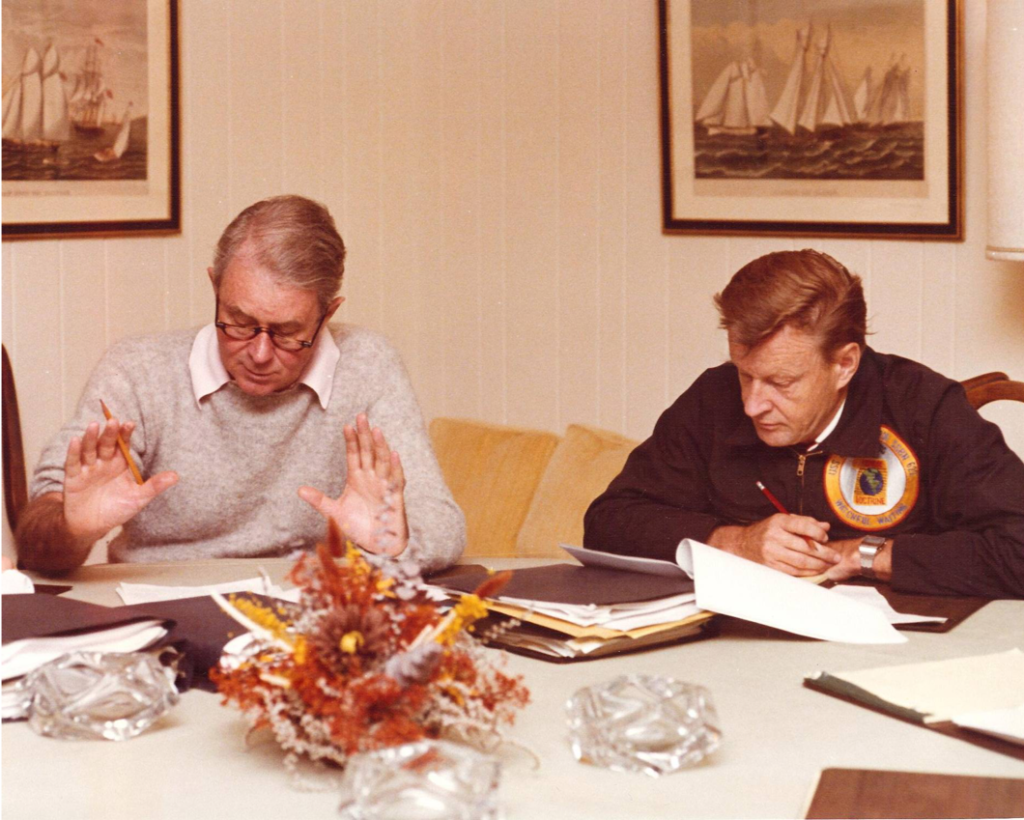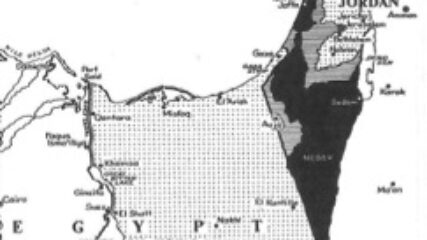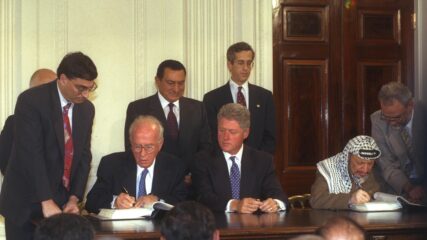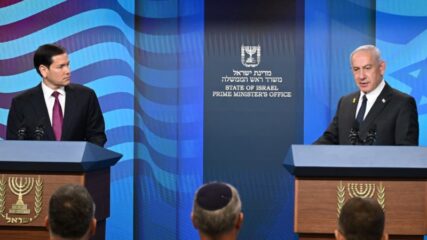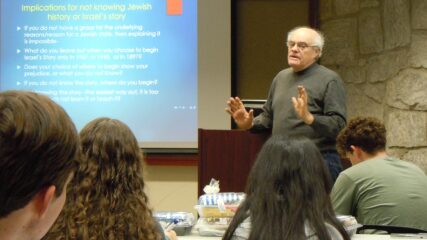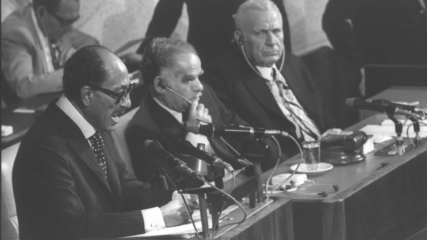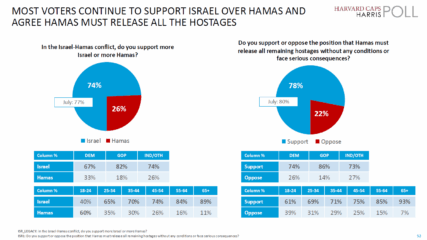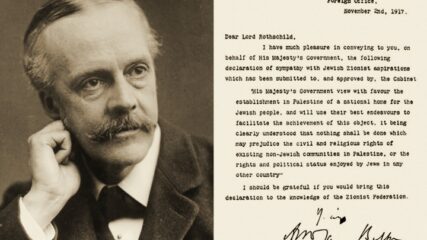September 14, 1978, 6:30 p.m.
Source: Israel State Archives/Box/A4314/1. Notes taken by Elyakim Rubinstein.
View the Memorandum in a Printable PDFAfter the first two days of the two weeks of the Camp David negotiations, Egyptian President Anwar Sadat and Israeli Prime Minister Menachem Begin barely met face to face. Sadat did not enjoy talking to Begin, and with President Jimmy Carter’s eager willingness, Sadat gave Carter and his team the prerogative to negotiate on Egypt’s behalf and pressure the Israelis where necessary. Sadat gave Carter a list of concessions that he was prepared to make. Sadat had no problem in adding to the known discomfort that characterized the Carter-Begin relationship. If Sadat could gain Sinai back and remove Israeli settlements from the peninsula, adding friction in the U.S.-Israeli relationship was a bonus.
Secretary of State Cyrus Vance’s meeting with the Israeli delegation exemplified the promotion of American interests. Vance gave the Israelis a document that, had the Israelis accepted, would have eventually devolved the West Bank into a Palestinian state. He suggested that a referendum be held by Palestinians in the West Bank and Gaza Strip at the end of the autonomy period of five years.
Begin told Vance that the Israelis at Camp David and therefore in Israel “are unanimous [in believing] what we have received from you on the last day of discussions is a formula that inevitably leads to a Palestinian state.” Israel at Camp David refused the Carter administration’s incessant demand to provide self-determination and a state for the Palestinians.
— Ken Stein, April 26, 2025
At the Prime Minister’s Cabin
Participants: Menachem Begin, Aharon Barak, Simcha Dinitz, Meir Rosenne, Abrasha Tamir, Elie Rubinstein, Secretary of State Cyrus Vance
Begin: Barak reported to me about the new paper that you gave him.
Vance: I gave it to him and to El-Baz and asked both of them to make their comments and report them to me at 18:30. I just asked El-Baz to send it to me, and will see him when I am done here.
Begin: I read it and we shall talk about it. Moshe talked with Sadat and will let you know about his impression. Sadat requested a promise from Moshe that an agreement will be signed here about the withdrawal of our settlements and converting all our flight services into civilian ones under the Egyptians’ management. Otherwise he will not sign. My response is: This policy contradicts the one that was adopted by our Government and approved by the Knesset. We are a democracy, therefore without an addendum to such declaration saying that it contradicts the policy. I’ll go home, I hope soon enough, and present these demands before the government and the Knesset, with all the facts, and they will decide. After a decision is made I’ll inform you about its content and then you will let Sadat know about Israel’s decision in both the Executive and the Legislative branches. As for this paper I wish to express my sorrow and wonderment that during our eight days of deliberations, negotiations, talks into the night, personal conversations etc., we are presented with this document. We read it; Moshe, Ezer and I, and we are unanimous on that — we have received from you on the last day of our discussions a formula that inevitably leads to a Palestinian state. This is our assessment and we cannot accept it. We stand firm on the formula that the American and Israeli delegations have worked out. We have made, I would say almost heroic efforts to arrive at an agreement, and the President came to see me, in a very generous gesture, to express his thanks for what we did. We have agreed to formulate, which we have totally rejected in the past — legitimate rights; a withdrawal; redeployment in specified security areas (we did not accept limited). The main point is that until half an hour ago on the subject that you have read — the Palestinian subject (we call it Palestinian Arabs) we have compromised. Here too in the letter, as you have wished, though the President should write in the letter that we call it Palestinian Arabs. And this should be a letter, not a draft, and it’s known that there is a difference. We have made all these efforts and this sacrifice — all, in order to arrive at an agreement that we are essentially interested in. But we did not expect to receive such a document in the last moment from the United States delegation. I’m very surprised and I have to say that this document is absolutely unacceptable to us. Barak will read what is agreed upon.
Vance: We have tried all the way to work with both sides and arrive at an agreement that all sides will accept. We have raised different formulae in an attempt to bridge the gaps, and there were still different opinions with regards to what was perceived by you and that it was agreed upon with us. There was no full agreement. There were important points that were raised by the Egyptian side — they were not unfair towards us and we have entered here what seemed to us as a restatement of some of the issues and clarifications in others and I’m sorry that it is not acceptable.
Begin: You said that the Egyptians are fair, what about us?
Vance: We appreciate you very much and I have said so, last night in reference to things that you have done. But we have not agreed on all. What we proposed yesterday was your version, where we have attempted to reach an agreement by all sides. And to come and say that this is accepted only by us and to reject what the Egyptians have to say is just not fair to imply that we cannot take into account points that are argued by the Egyptians. We are trying to bridge.
Begin: I never said that I have asked you not to consider the comments made by the Egyptians. We had an agreement on a certain formula (not in all).
Barak: We are talking about part of the framework that deals with the West Bank and Gaza and it contains numerous issues that are not agreed upon. There are two points; one is — let us call it — the Aswan Formula.
Vance: That was in Clause 1 and you wanted to add a sentence and we requested the Egyptians to accept it. They did not.
Barak: Clause 1 (the Aswan formula) we agreed to it verbatim with the addition of through talks and you requested the Egyptians to accept.
Vance: We requested and we wished that they would accept.
Begin: On March 21, 1978, you presented us with a document that you have assessed to be your best judgment as to what would be minimally accepted by the Egyptian government.
Vance: The best judgment was no more than a guess, estimation.
Begin: He reads the document and the words through talks.
Vance: I remember it well, but our best judgment proved to be a mistake, because they did not accept.
Begin: For us it was important, you said it would be acceptable.
Vance: There was a best judgment and it was proven to be a mistake. All we could have given was best judgment.
Begin: But already in March you regarded it as acceptable.
Vance: But we were proven to have been mistaken and it was already early after March.
Barak: He describes the formula in question. Clause A was almost agreed upon.
Vance: There were problems here too.
Barak: The principal clause was (C).
Vance: Correct.
Barak: All that was not agreed upon were the American, Egyptian and Israeli versions. I saw the Egyptian version.
Vance: El-Baz called us and promised to deliver it but did not. But this was clearly objectionable and I told him so.
Barak: Each one read his own clause and my reaction to his version was: Unacceptable. The President wanted to accept ours and I suggested to him to read it carefully and now you brought a new attempt to bridge. But your technique in trying to bridge Clause 1 was broken into two parts and this is where we have a problem. With regards to the new text — the thing that happened in Part (C) — and this is the main problem — means that the negotiations should be on the final solution. You said that its main purpose is — and here you have broken the Aswan formula — to allow them to participate in determining their own fate. Through talk was taken out and two elements were added:
- Referendum
- The form of government
The new (C) is such that the discussion in the final status is the implementation of the Aswan formula that becomes essential by including in it the establishment of a Palestinian state. And all the delicate balance that we discussed yesterday for hours, the Aswan Formula, was broken and I was surprised that El-Baz did not accept it.
Vance: I was not surprised, because he declared immediately that he will not accept it. What I tried to do was as follows: I noticed that he was very strict and I considered explaining that instead of the through talks I should present the various stages and through it finding a way to fulfill your wish without the use of these words. He instantly clarified that he does not want talks without the solution of the problem and this is why decided to suggest that there will be determination at the end of the five-year period and transfer the matter to the population for approval.
Begin: This formula that we have not heard about until now means referendum. I shall bring a quote from Meinertzhagen, who served as a British political officer in Palestine. In his memoires (page 25) it says that Balfour used to answer those who demanded referendum, that in any referendum with regards to Palestine, it’s necessary to consult the world’s Jewry. When Balfour said it, he knew that there were 50 to 75 thousand Jews in Palestine and still proclaimed that it belonged to the Jewish people. If the people wished to have a referendum then it should be voted by the entire Jewish people. This is why we rejected the idea of referendum. The Jews have only one country — Palestine, Eretz Israel — and that’s why we can’t accept the idea of referendum. Under the current circumstance, if the PLO will vote for a Palestinian state, even with ties to Jordan and with 6,000 tanks in the North, it creates a danger of death to Israel. With that said, we spoke throughout our talks in Camp David and this idea never emerged, and it came about only today. And this is why I said that it is surprising. Today and the next couple of days are the last of our deliberations and El-Baz says that resolution is necessary and you enter this idea, please understand why I am surprised.
I cannot say that we signed it, but I asked the President what if we do not reach an agreement about sovereignty at the end of the five years, I do reiterate our demand for sovereignty and insist on it. There are additional demands but we let go of them for the sake of reaching an agreement.
What if we cannot reach an agreement when every side demands sovereignty? The result — the autonomy continues. Brzezinski also thought about it. We want peace, partnership in enterprises. You have suggested a police force, solely manned by Jordanian soldiers — a matter that only 8 days ago seemed like a dream — and we agreed to it by the authority that was granted to us by our government. And now appears the matter of referendum that I know its results, if the PLO participates in it.
Vance: They will vote on whether to receive or reject the treaty.
Begin: You write government. You could have written state; only a state has a government. We know that you object to the establishment of a Palestinian state, but in order to comply with the Arab stance, you have entered a formula that is leading to a Palestinian state and this endangers the survival of Israel.
Vance: We wished to assist you with the ties with Jordan. But you rejected it and we took it out. We wished to say that there will be no Palestinian state.
Begin: The ties with Jordan are not theoretical, but that being defined as a Palestinian identity is.
Vance: Indeed.
Begin: At the threshold to our home, and under the control of the PLO. Jordan has Iraq behind her, Syria in the north and this is why we cannot accept and propose to postpone the sovereignty issue to five years. We shall try to arrive to it and if not — the autonomy will continue. We are not applying our laws, we leave it out, and this is a sacrifice of our own convictions. What we have here is a Palestinian state.
Barak: In my view, the referendum in this context is not a central matter, because the question in the referendum is not what will be the region, but if we ratify the treaty in the negotiation where we have a veto power.
Begin: There is no way to know what’s being put in the voting booth. The most that can happen is that the status quo will remain.
Vance: You are exaggerating the significance of the referendum.
Barak: The main problem is that the purpose of the agreement is to allow the Palestinians to participate. This is the Arab concept. From our perspective the purpose of the final status for West Bank may be under Israeli sovereignty. It’s entirely unbalanced — you cannot say the purpose at the end of the five years is to find a solution to the Palestinian problem but rather to the picture as a whole. When I proposed the idea yesterday, you said to El-Baz — we should enter a clause that will allow Israel to demand its sovereignty. Nothing in here mentions it.
Vance: You may write a clause noting that you reserve your right.
Barak: That’s a different matter when it’s done in such fashion. …
Vance: Otherwise you may give up. …
Begin: The outcome will not be catastrophic. The autonomy will go on; a council will continue to function etc.
Vance: I thought that we agreed that the Palestinians will participate in deciding their status, but you wish to have a say on what should be their stand.
Begin: We said: they will participate in the formation of their position. In practice, each side will raise its demand for sovereignty. We may find a solution and if we do not and there will be no agreement on the issue of sovereignty, the autonomy will go on and we shall try again. We are not annexing even one square Kilometer and there will be no land purchases even after the five year period.
Dinitz: Barak covered a point that I wished to point out — we are ignoring other options. As for the referendum, even when you suggested it to us in the past. …
Vance: At that time it was real and not just ratification.
Dinitz: The options were limited, such as — that they will decide the form of government.
Vance: If there is a wish that the administrative council will continue to act in one form or
another, all this is actually a form of government. If there is a will to have them participate in shaping their future it’s not so terrible to ask for it.
Begin: In the Aswan formula the word government does not exist. Not even a single time. And for various reasons, it’s not mentioned in other documents as well.
Vance: It is about a treaty that you can ratify and decide if there is a will for administrative council.
Dinitz: Is this treaty based on unanimous agreement?
Vance: Certainly.
Dinitz: Why the formula with regards to the purpose?
Vance: The purpose is that you will not play, but will allow them to really participate. There will be people who may not agree to the validity of their elected representatives.
Rosenne: In the Aswan formula there is all its aspects and you are relating only to the political aspect.
Vance: We are relating to others, refugees etc. The treaty will cover the full scope of the relations.
Begin: We have a withdrawal of its all forces and here you wrote the withdrawal.
Vance: We agreed to a withdrawal in response to your request. I accepted, if the other would agree.
Begin: That’s not what I meant. In the first part there is a withdrawal — retreat and redeployment — we do not accept limited, specified but when it leads to a solution it will say the withdrawal.
Vance: In every version in the past we used the, or withdrawal. Using a is only because you requested it only today.
Begin: Yesterday.
Vance: I have heard it for the first time; a withdrawal is in (A). In (C) there was a withdrawal and we never discussed, because we said that we shall enter a new version.
Begin: We have committed to the withdrawal of our forces in (A) but in (C) it meant the last soldier.
Barak: We did not discuss (C) with the Americans and the Egyptians because we presented a new version.
Vance: It is possible to discuss a withdrawal, though I never heard of it. I’ll be happy to sit down with you and scrutinize line after line.
Begin: In comparison to previous documents, I wish that you will understand that this is the most sensitive problem. In the past it was said — that this was the core of the problem. Now the Sinai is becoming the core of the problem. In the past they talked differently, where only Judea and Samaria was important to them. There is a change in substance here and that is why it is not accepted. It was unanimous in the room. Everyone — Moshe and Ezer were surprised. With regards to the Aswan formula — if we dissect it and there is no through talk, the world is changing for us.
Vance: Carter’s Aswan formula did not include through talks.
Begin: Here is the document of March 23.
Vance: You have asked for our opinion, I guess, but this was not Carter’s version. We have asked the Egyptians and they rejected it. I tried to find an alternate way to solve the problem — a negotiation in an attempt to have them come closer. I thought that I was assisting.
Begin: I am sure of it but this is not what is happening in reality.
Vance: I regret that we do not advance on that matter and others. I am sad that it is not in our hands to solve this problem and the Jerusalem clause.
Begin: This morning we were close to an agreement.
Vance: We were never close on that issue.
Begin: The President said yesterday…
Vance: Not on this subject.
Barak: The Americans said that they will accept it if the Egyptians will.
Vance: Yes.
Begin: But the potential agreement with us does not exist.
Barak: With regards to Jerusalem El-Baz said that he might bring something.
Vance: I hope, we broke our heads on this issue but did not succeed. I think that we have brought forth an imaginative version on that issue and others in order to bridge the gap, such as the issue of the military administration. If this is not good enough, we have tried and failed — that’s the way it is.
Begin: I say in clear conscience, as Sadat loves to say, that we made a serious intellectual and moral effort.
Vance: I think that we should try again. I’ll try to meet with El-Baz.
Begin: Barak has a suggestion with regards to this clause.
Vance: It is not accepted by the Egyptians and by us. I spoke with the president.
Begin: We have arrived at a stage of exchanging declarations of non-acceptances.
Vance: It is very bad and it is a pity if it is impossible to proceed.
Dinitz: In my opinion at this stage it is not a question of phrasing but of a clash of concepts between those of the Arabs and of ours and it may be manifested for the first time in the document that was presented to us. I do not think that they changed their mind with regards to a Palestinian state, or the right to it.
Begin: Sadat said “Palestinian state” at the presence of Carter.
Dinitz: You are familiar with our traditional positions and we have taken a long road in Camp David. We were asked to make versions that will appeal to the Arabs’ tastes while maintaining the principles that are important to you.
Vance: We have struggled to do so.
(Vance was called to the phone; the president was on the line.)
Vance: I must leave to see the president. I’ll be ready to meet again this evening and try and see how the Egyptian responded to the proposals that you have put forward.
Begin: (To Barak) Prepare our text and we’ll see what can be done. The American document does not serve as a basis for discussion and you will meet with the secretary. The American document is unacceptable to us.
(Vance exited.)
Begin: Vance was angry, red-faced, almost lost his courteousness.
(A consultation with those present followed.)

